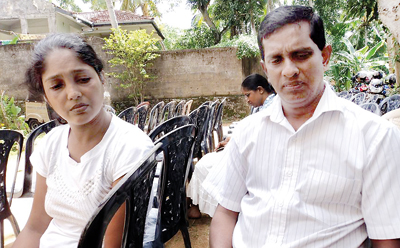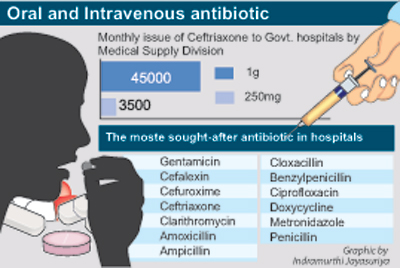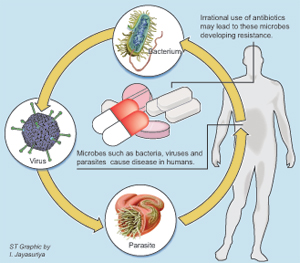News
Antibiotic under microscope after young flu victim dies
The Health Ministry has instructed Provincial Health Directors, Medical Officers of Health and Food and Drug Inspectors to launch inspections and take action against those who are still selling or using a withheld drug usually given for bacterial infections.
Cosmetic Devices and Drug Regulatory Authority Director Dr. Hemantha Beneragama told the Sunday Times the Health Ministry withheld the use of the antibiotic ceftriaxone brand ‘monotax’ after a nine-year old died on being administered the drug.

The grieving parents of little Kaveesha. Pix by K.D. Sugathapala
“At present, the brand is not being used in State hospitals and we have informed the Private Sector Regulatory Authority to inform all private hospitals to withhold the use of it until the results of lab tests are released,” he said.
Kaveesha Jayewardena (9), a Grade 4 student of Southlands College, Galle died while being treated for flu with symptoms of vomiting and high fever.
On Monday, the Health Ministry sent a team to Karapitiya Hospital in Galle where the child died. Dr. Beneragama said the team included Colombo Medical Faculty members and officers from the Cosmetic Devices and Drug Regulatory Authority, National Drug Quality Assurance Lab (NDQL) and Medical Supplies Division. At present the NDQL is running quality checks on the drug.
He said storage facilities at the hospital were also being checked while the young victim’s blood and cell samples have been sent for laboratory tests. Karapitiya Teaching Hospital Director Jayampathi Senanayake said following the little girl’s death the batch of drugs was withdrawn.
“The clinical diagnosis was that the child suffered an anaphylactic shock, which is a result of a severe allergic reaction. But this has to be proven with laboratory tests,” he said. Medical Supplies Division (MSD) Director Kamal Jayasinghe said ceftriaxone was commonly used in State hospitals to treat severe bacterial infection when first line antibiotics did not respond.
“We have informed the pharmaceutical company to stop importation and distribution of this brand until lab tests are released. Once the reports come we can determine whether the medicinal drug was impure or whether she died of a fatal allergic reaction leading to anaphylactic shock,” he said.
Dr. Jayasinghe said that if the tests show that there was a problem with the drug, it would be immediately withdrawn from hospitals.
The MSD issues 45,000 vials of one gram ceftriaxone and 3,500 vials of 250 mg of the antibiotic to State hospitals every month.
A spokesman of the local company that imports the brand Monotax said that the Indian company had been informed.
“We received a letter from the ministry to immediately stop issuing this medicine to the market until laboratory test results were released,” she said.
Medical Research Institute consultant immunologist Dr. Rajeeva de Silva said hypersensitivity to medicinal drugs can result in reactions ranging from mild itching to even death. “The immune system shows an exaggerated sensitivity and usually the reaction is not on the first exposure but in subsequent exposures,” he said.

Kaveesha
Dr. de Silva said if the skin reacted to a drug the symptoms would range from redness to itchiness and if the respiratory system (lungs) was affected there would be symptoms of a cough, difficulty in breathing and asthmatic symptoms. If the cardiovascular system (heart) was affected there would be a reduction in blood pressure and blood flow to the heart resulting in anaphylaxis.
“If two or more organs are involved then the patient can experience an anaphylactic shock. But in 80 to 90 percent of cases it is the skin that is mostly affected,” he said.
Dr.de Silva said there are only a few validated tests to check allergic reactions caused by medicinal drugs.
“We get many patients with allergic reactions but they have either lost the prescriptions or in some instances thrown them away.” When it comes to allergic reactions he said it was important to know what the exact drug was.
He said that quotations have been called by the MRI and have been handed over to the Health Ministry for the purchase of an automated system that could find the type of the allergen and the cause of anaphylaxis.
In this instance the victim’s mother Lasanthi Kumagoda said little Kaveesha was taken to the Outdoor Patients Department (OPD) of the Mahamodera Hospital to get treatment for high fever and vomiting. However they were told to take Kaveesha immediately to the Karapitiya Hospital where she was adminstered the first dose of ceftriaxone.
“But after the third dose, she screamed saying she felt a current running through her body. She had breathing difficulties and her body started getting red,” Kaveesha’s mother said. She died while being treated at the Intensive Care Unit.
The inquest held by Galle City Coroner B.G.N. Karunatilake, stated that based on a blood test it was revealed that Kaveesha suffered from a bacterial infection. She was prescribed the administration of cefriaxone.
 |
Follow @timesonlinelk
comments powered by Disqus



























